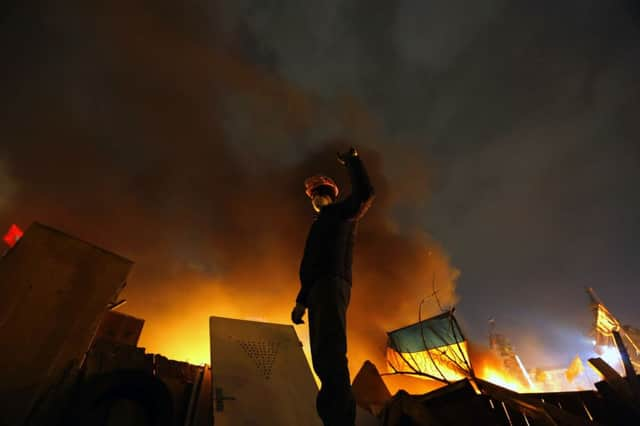Army steps into Ukraine crisis


He announced the move in a decree a day after some of the worst violence Kiev has witnessed since the end of the Second World War.
At least 26 people were killed and more than 425 were injured in clashes between police and protesters.
Advertisement
Hide AdAdvertisement
Hide AdThe two sides are locked in a stalemate over the identity of the nation of 46 million, whose loyalties are divided between Russia and the West. The protests began in late November after Mr Yanukovich backed off a deal with the European Union in exchange for a £9 billion bailout from Russia.
Ukraine’s health ministry reported at least 26 people had died, including ten policemen, as thousands of members of the security forces and anti-government protesters engaged in ferocious street battles involving live ammunition and petrol bombs for control of Maidan (Independence) Square.
The clashes reduced parts of Kiev to a burning warzone, and officials said 241 people required hospital treatment although the true figure is probably far higher given that wounded protesters stay clear of hospitals fearing they will be arrested there.
Coming after a comparative lull in the standoff between protesters and police that has existed in Kiev since late November, the scale of the bloodletting prompted EU leaders to express their horror, while the EU looks set to impose sanctions on Ukraine’s political leadership.
“There are unspeakable, unacceptable, intolerable acts being carried out in Ukraine,” said François Hollande, the French president at a press conference with the German chancellor, Angela Merkel.
Jose-Manuel Barroso, the outgoing head of the European Commission, expressed his “shock, dismay” over the situation in Kiev and blamed Ukraine’s leaders.
“It is the political leadership that has a responsibility to ensure the necessary protection of fundamental rights and freedoms,” he said. “It was with shock and utter dismay that we have been watching developments over the past 24 hours in Ukraine.”
The level of the violence, and the distinct prospect of further deaths, appears to have goaded EU leaders to ditch their cautious approach of expressing “concern” over the situation in Ukraine in favour of a more robust position aimed at hurting the political leadership.
Advertisement
Hide AdAdvertisement
Hide Ad“All possible options will be explored, including restrictive measures against those responsible for repression and human rights violations,” said Catherine Ashton, the Labour peer who heads EU foreign policy.
On Wednesday morning Donald Tusk, the Polish prime minister, called for targeted sanctions on “the perpetrators of Ukraine’s misery”, and added he would press all EU leaders to follow his call.
Later Piotr Sefarin, Poland’s deputy foreign minister, said “there was full unity of views among all the people with whom prime minister Tusk spoke,” adding “the events over the last 24 hours justify the decision of the EU on sanctions.”
EU foreign minister will meet in an emergency meeting this morning to discuss how to react to the worsening situation in Ukraine.
In response to the turmoil, Mr Yanukovich rounded on the protesters and opposition leaders. “Without any mandate from the people, illegally and in breach of the constitution of Ukraine, these politicians – if I may use that term – have resorted to pogroms, arson and murder to try to seize power,” he said.
He also issued a veiled threat to opposition leaders, warning them to distance themselves from the “radical forces provoking bloodshed” or face a “different kind of conversation”.
As an indication of the government’s apparent growing desire to crush the opposition, yesterday Ukraine’s security services announced the launch of an “anti-terrorist operation across the territory of Ukraine,” and claimed that radical forces posed a threat to millions of Ukrainians. The security services added that 1,500 firearms and 100,000 rounds of ammunition were now in the hands of “criminals”.
At Maidan Square, activists who had resisted the police onslaught on Tuesday night, rebuilt barricades and re-armed by tearing up and breaking hundreds of cobblestones to be used as missiles, and prepared petrol bombs.
Advertisement
Hide AdAdvertisement
Hide AdOpposition leaders said talks with Mr Yanukovich had yielded no results so, with neither side appearing to waver, the dangerous and bloody political standoff looks set to continue.
Meanwhile, the worsening state of Ukraine’s economy could add further instability to the situation. The hryvna, its currency, has lost 10 per cent of its value since the start of the year, and hard currency reserves have started to dwindle.